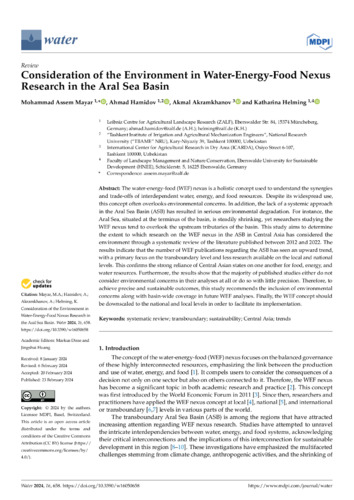Consideration of the Environment in Water-Energy-Food Nexus Research in the Aral Sea Basin
Abstract
The water-energy-food (WEF) nexus is a holistic concept used to understand the synergies and trade-offs of interdependent water, energy, and food resources. Despite its widespread use, this concept often overlooks environmental concerns. In addition, the lack of a systemic approach in the Aral Sea Basin (ASB) has resulted in serious environmental degradation. For instance, the Aral Sea, situated at the terminus of the basin, is steadily shrinking, yet researchers studying the WEF nexus tend to overlook the upstream tributaries of the basin. This study aims to determine the extent to which research on the WEF nexus in the ASB in Central Asia has considered the environment through a systematic review of the literature published between 2012 and 2022. The results indicate that the number of WEF publications regarding the ASB has seen an upward trend, with a primary focus on the transboundary level and less research available on the local and national levels. This confirms the strong reliance of Central Asian states on one another for food, energy, and water resources. Furthermore, the results show that the majority of published studies either do not consider environmental concerns in their analyses at all or do so with little precision. Therefore, to achieve precise and sustainable outcomes, this study recommends the inclusion of environmental concerns along with basin-wide coverage in future WEF analyses. Finally, the WEF concept should be downscaled to the national and local levels in order to facilitate its implementation.

